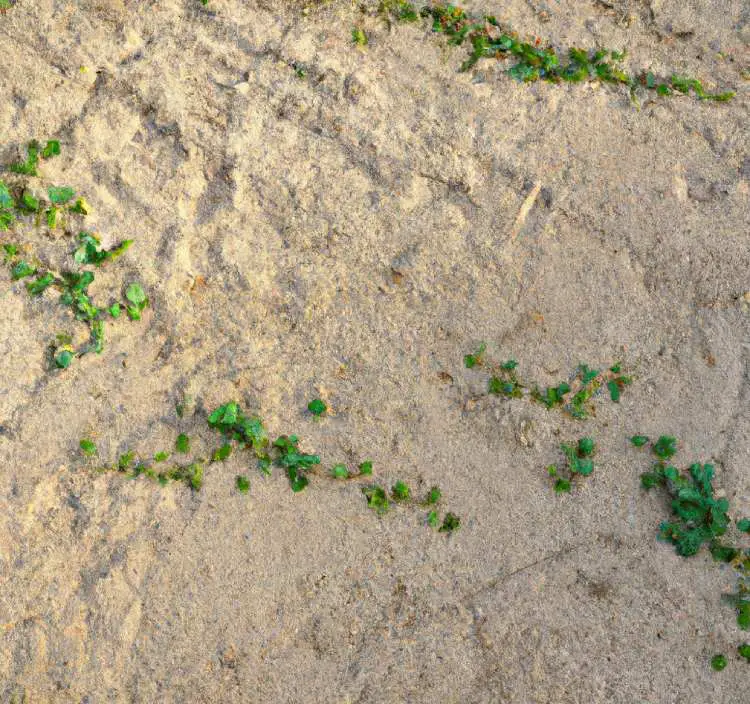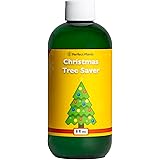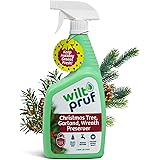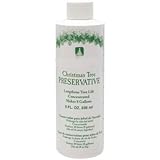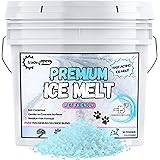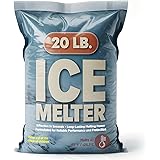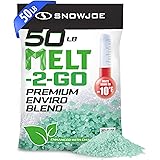Weeds. Those pesky invaders that seem to pop up everywhere, mocking our pristine gardens and manicured lawns. We’ve all fought the never-ending war against these unwelcome guests, employing various strategies to keep them at bay. But have you ever wondered if something as simple as sand can actually prevent weed growth?
Can sand be the secret weapon in our quest for a weed-free paradise? Let’s dive in and uncover the truth.
Does Sand Stop Plant Growth?
Many gardeners and homeowners swear by the power of sand in thwarting weed growth. But does it really work? The short answer is, it depends.
Sand, with its coarse texture and lack of nutrients, can indeed create an inhospitable environment for weed seeds to germinate. When spread over the soil surface, sand acts as a physical barrier, preventing weed seeds from making direct contact with the soil and taking root. It also hinders their access to light, inhibiting their growth.
However, it’s important to note that sand alone is not a foolproof solution. Determined weeds can find ways to penetrate even the smallest gaps in the sand layer or exploit existing soil pockets to establish themselves. Additionally, some weed species have seeds that are adapted to survive in harsh conditions, including sandy soils.
What Is the Best Sand to Prevent Weed Growth?
Not all sands are created equal when it comes to weed prevention. If you’re considering using sand as a weed deterrent, choosing the right type is crucial.
- Coarse Sand
Opt for coarse sand with larger particles, such as builders’ sand or horticultural-grade sand. Fine sands, like play sand, tend to clump together and form a dense layer that may actually encourage weed growth.
- Sharp Sand
Look for sand with angular grains, commonly known as sharp sand. Its rough texture makes it harder for weed seeds to find purchase, reducing the likelihood of germination.
- Silica Sand
Silica sand, often used in sandblasting or for aquariums, is another option. Its gritty texture can discourage weed growth while allowing water to permeate.
Remember, the goal is to create an unfavorable environment for weeds, so choose a sand that disrupts their ability to take root effectively.
How Do You Permanently Stop Weeds from Growing?
While sand can help in weed control, a more comprehensive approach is necessary for long-term prevention. Here are some strategies to permanently stop weeds from growing:
- Mulching
Apply a layer of organic mulch, such as wood chips or straw, to suppress weed growth. Mulch acts as a physical barrier, inhibiting weed emergence while retaining soil moisture and adding nutrients as it breaks down.
- Proper Soil Preparation
Prepare your soil before planting by removing existing weeds and their roots. Loosen the soil to discourage weed seed germination and improve drainage.
- Regular Maintenance
Stay vigilant and remove any weeds that manage to sprout promptly. Hand pulling or using a garden tool like a hoe can be effective for small infestations.
- Landscape Fabric
Consider using landscape fabric or weed barriers beneath mulch or gravel paths. These materials prevent weed seeds from reaching the soil and establish a physical barrier.
- Selective Herbicides
In severe cases, selective herbicides can target specific weed species without harming desirable plants. Consult with a local gardening expert or follow the product instructions carefully.
What Prevents Weed Growth?
Apart from sand, several factors contribute to weed growth prevention. Understanding these factors can help you develop a comprehensive weed control strategy. Here are some key factors that prevent weed growth:
- Proper Plant Spacing
Planting your desired plants close together and providing them with adequate space can minimize the opportunity for weeds to take hold. The dense foliage of established plants shades the soil, preventing weed seeds from receiving the necessary light for germination.
- Healthy Soil
Maintaining healthy soil conditions is essential for preventing weed growth. Healthy soil provides an optimal environment for your desired plants to thrive, making it more difficult for weeds to compete. Regularly amend your soil with organic matter, such as compost, to improve its fertility and structure.
- Proper Watering
Water your plants deeply and infrequently to encourage deep root growth. By watering deeply, you promote stronger plants that can better compete with weeds for resources like water and nutrients.
- Regular Weeding
Weeding is an ongoing task in any garden or landscape. Regularly inspect your planting beds and remove any emerging weeds before they have a chance to mature and set seed. This proactive approach prevents weed proliferation.
- Maintaining Healthy Turf
In lawns, maintaining a healthy turf is vital for weed prevention. Regular mowing at the appropriate height for your grass type, proper fertilization, and overseeding bare spots can help create a dense turf that inhibits weed establishment.
What Kills Weeds Naturally?
If you prefer to take a natural approach to weed control, several methods can help kill weeds without relying on synthetic herbicides. Here are some effective natural weed killers:
- Boiling Water
Boiling water can be an effective and environmentally friendly way to kill weeds. Pouring boiling water directly onto the weeds will scorch the leaves and kill them. Be cautious when using this method, as boiling water can also harm nearby plants.
- Vinegar
Vinegar, specifically white vinegar with a high acetic acid concentration, can be a potent weed killer. Spray the vinegar directly on the weeds, targeting their foliage. Keep in mind that vinegar is non-selective and may damage or kill desired plants as well.
- Salt
Salt is another natural weed killer, but it should be used with caution. Sprinkling salt directly on weeds or in the soil can dehydrate the plants and hinder their growth. However, salt can also harm soil fertility and may have long-term negative effects on plants, so it should be used sparingly and with care.
- Corn Gluten Meal
Corn gluten meal is a natural pre-emergent herbicide that can prevent weed seeds from germinating. Apply it to your soil before weed seeds have a chance to sprout to inhibit their growth. It is effective for annual weeds but may not be as effective against perennial weeds.
What Kills Weeds Fast?
When you need to deal with weeds quickly, you may prefer methods that provide fast results. Here are a couple of options for fast-acting weed killers:
- Glyphosate-Based Herbicides
Glyphosate-based herbicides are widely used and known for their effectiveness in killing weeds quickly. These herbicides are non-selective, meaning they can harm or kill any plant they come into contact with. Use them carefully and follow the instructions to minimize environmental impact.
- Organic Acetic Acid-Based Herbicides
Organic herbicides containing acetic acid, derived from sources like vinegar, can provide fast results. They work by desiccating the weed’s foliage upon contact. Similar to vinegar, they are non-selective and can harm desirable plants, so use them judiciously.
Remember, regardless of the weed control method you choose, it’s crucial to understand the specific needs of your plants and take appropriate measures to protect them from harm. Always read and follow the instructions provided by the product manufacturer to ensure safe and effective use.
FAQ Section
Sand can impede plant growth, especially when used as a layer on the soil surface. Its coarse texture and lack of nutrients create an unfavorable environment for plants to establish and thrive. However, some determined plants can still find ways to grow in sand, particularly if they have adaptations to survive in such conditions.
Coarse sand with larger particles, such as builders’ sand or horticultural-grade sand, is ideal for preventing weed growth. Avoid using fine sands, as they can clump together and actually encourage weed growth. Additionally, opt for sharp sand with angular grains, which makes it harder for weed seeds to germinate and take root.
To permanently stop weeds from growing, take a multifaceted approach. This includes regular weeding, proper soil preparation, mulching, maintaining healthy plants and turf, and using landscape fabric or weed barriers. Combining these methods helps prevent weeds from establishing and reseeding, leading to long-term weed control.
Several factors contribute to weed growth prevention. These include proper plant spacing, healthy soil conditions, regular weeding, maintaining healthy turf in lawns, and implementing preventive measures like mulching and landscape fabric. By creating unfavorable conditions for weed seeds to germinate and compete, you can effectively prevent weed growth.
There are several natural methods to kill weeds. Some effective options include pouring boiling water onto the weeds, spraying vinegar directly on the foliage, using salt sparingly, and applying corn gluten meal as a pre-emergent herbicide. These natural methods are alternatives to synthetic herbicides and can be effective in controlling weeds.
Glyphosate-based herbicides are known for their fast-acting weed-killing properties. However, it’s important to note that they are non-selective and can harm or kill any plant they come into contact with. Organic acetic acid-based herbicides can also provide fast results by desiccating the weed foliage upon contact. These methods should be used with caution and following the instructions provided to minimize any unintended damage.
Wrapping Things Up
In conclusion, while sand can act as a physical barrier to weed growth, its effectiveness may vary depending on the type of sand and the adaptability of weed species. Combining sand with other weed control strategies, such as proper soil preparation, mulching, and regular maintenance, will yield better results in the ongoing battle against weeds. Additionally, natural weed killers and fast-acting herbicides can be utilized depending on your specific needs and preferences.
Remember to choose the methods that align with your gardening goals and prioritize the health of your desired plants. With a comprehensive approach, you can achieve a weed-free and flourishing garden or landscape.
Auto Amazon Links: No products found.
Perfect Plants Christmas Tree Saver 8oz. | Easy Use Xmas Tree Preserver Food | Have Healthy Green Christmas Trees All Holiday Season
$16.99 (as of January 29, 2026 21:44 GMT +00:00 - More info- Product prices and availability are accurate as of the date/time indicated and are subject to change. Any price and availability information displayed on [relevant Amazon Site(s), as applicable] at the time of purchase will apply to the purchase of this product.
VEVOR Tree Watering Bags Slow Release, 4 Pack 16 Gallons Tree Watering Ring, Reusable Refillable Tree Irrigation Ring Water Bags, Heavy Duty Watering System for Shrub Tree Root Drip Irrigation
$29.99 (as of January 29, 2026 21:44 GMT +00:00 - More info- Product prices and availability are accurate as of the date/time indicated and are subject to change. Any price and availability information displayed on [relevant Amazon Site(s), as applicable] at the time of purchase will apply to the purchase of this product.
Wilt-Pruf® Christmas Tree/Cutting Preserver Spray |Preserves Christmas Trees, Wreaths, Garlands, Cuttings and Carved Pumpkins | Reduces Needle Drop | Keeps Cut Trees Fresh Longer | Natural (32 oz)
$21.99 (as of January 29, 2026 21:44 GMT +00:00 - More info- Product prices and availability are accurate as of the date/time indicated and are subject to change. Any price and availability information displayed on [relevant Amazon Site(s), as applicable] at the time of purchase will apply to the purchase of this product.
Rocky Mountain Goods Christmas Tree Food - 8 oz Tree Preservative - Reduce Needle Drop - Greener Scent - Fir, Pine, Spruce Trees - Extend Tree Life
$9.95 (as of January 29, 2026 21:44 GMT +00:00 - More info- Product prices and availability are accurate as of the date/time indicated and are subject to change. Any price and availability information displayed on [relevant Amazon Site(s), as applicable] at the time of purchase will apply to the purchase of this product.
Kaiedos Christmas Tree Watering Funnel - 39 Inch Funnel, Reusable Design, Makes Watering Your Live Tree a Snap!
$14.99 (as of January 29, 2026 21:44 GMT +00:00 - More info- Product prices and availability are accurate as of the date/time indicated and are subject to change. Any price and availability information displayed on [relevant Amazon Site(s), as applicable] at the time of purchase will apply to the purchase of this product.
Wagner's 53002 Farmer's Delight Wild Bird Food with Cherry Flavor, 10-Pound Bag
$12.48 (as of January 30, 2026 13:52 GMT +00:00 - More info- Product prices and availability are accurate as of the date/time indicated and are subject to change. Any price and availability information displayed on [relevant Amazon Site(s), as applicable] at the time of purchase will apply to the purchase of this product.
Trade Grade Pet-Friendly Ice Melt - Fast Acting Magnesium Chloride Formula, Safer for Pets & Surfaces, 15lb Bucket
$45.98 (as of January 30, 2026 13:52 GMT +00:00 - More info- Product prices and availability are accurate as of the date/time indicated and are subject to change. Any price and availability information displayed on [relevant Amazon Site(s), as applicable] at the time of purchase will apply to the purchase of this product.
Maple99 Ice Melt Safer for Concrete-20 lb Bag, Ice Crusher Blend Snow Salt Ice Melt, Salt for Snow and Ice Removal, Sidewalk Salt, Driveway Salt, Snow Melt is Effective Up to -15
$63.99 (as of January 30, 2026 13:52 GMT +00:00 - More info- Product prices and availability are accurate as of the date/time indicated and are subject to change. Any price and availability information displayed on [relevant Amazon Site(s), as applicable] at the time of purchase will apply to the purchase of this product.
TERRO Ant Killer Bait Stations T300B - Liquid Bait to Eliminate Ants - Bait System - 12 Count Stations for Effective Indoor Ant Control
$12.99 (as of January 30, 2026 13:52 GMT +00:00 - More info- Product prices and availability are accurate as of the date/time indicated and are subject to change. Any price and availability information displayed on [relevant Amazon Site(s), as applicable] at the time of purchase will apply to the purchase of this product.
Snow Joe Premium Enviro Blend Ice Melt, Green-Coated Deicer Crystals, 50 lb - Safer Melter for Vegetation, Concrete & Metals w/ Anti-Corrosion Calcium Magnesium Acetate
$35.97 (as of January 30, 2026 13:52 GMT +00:00 - More info- Product prices and availability are accurate as of the date/time indicated and are subject to change. Any price and availability information displayed on [relevant Amazon Site(s), as applicable] at the time of purchase will apply to the purchase of this product.

